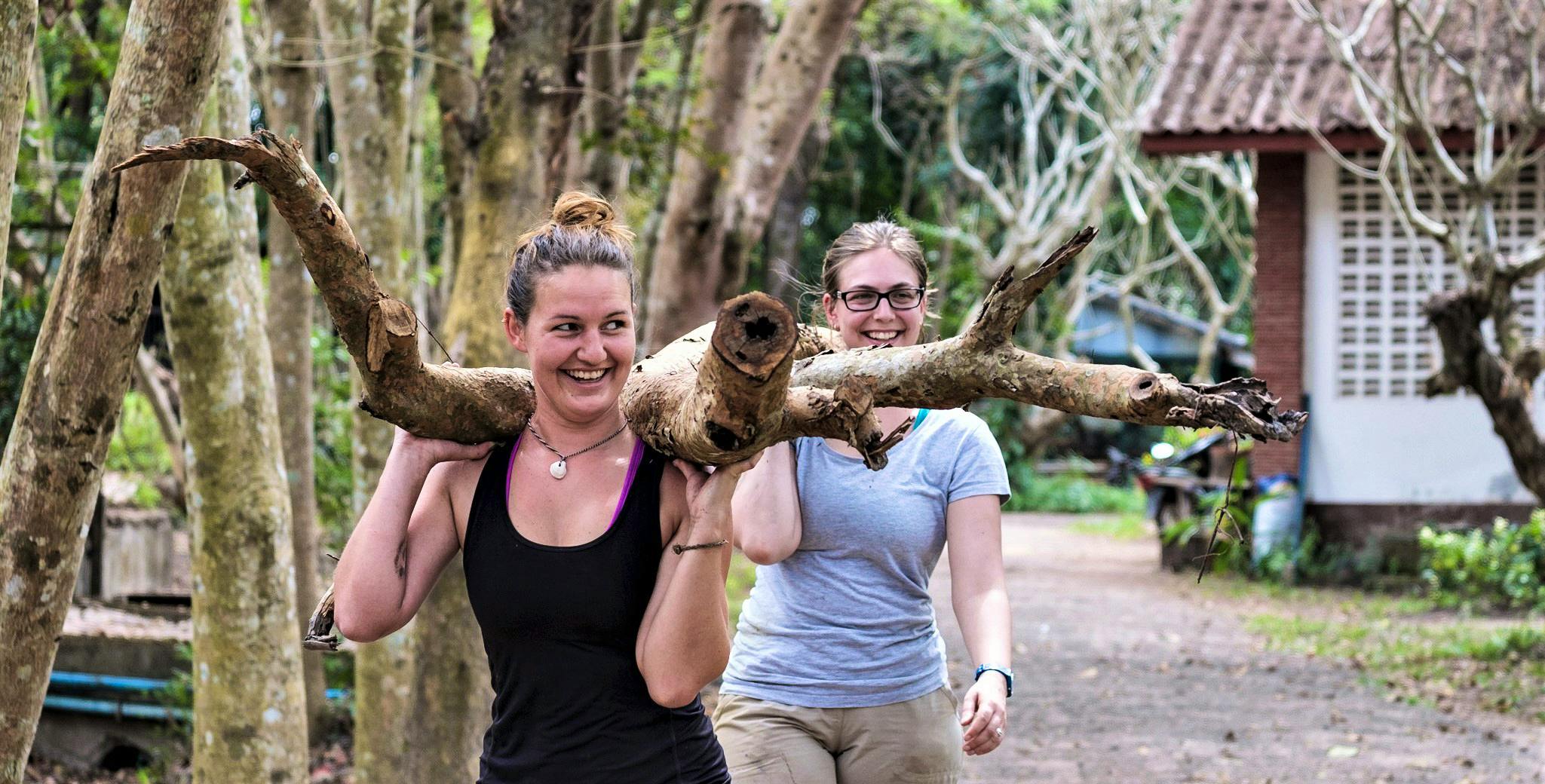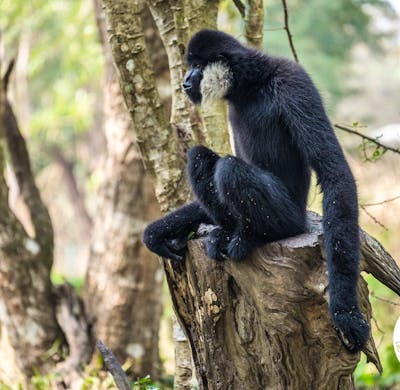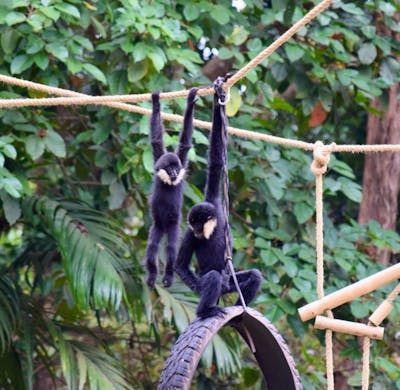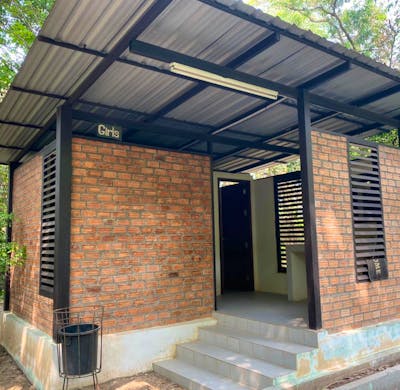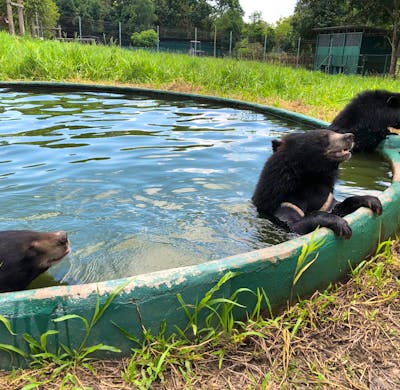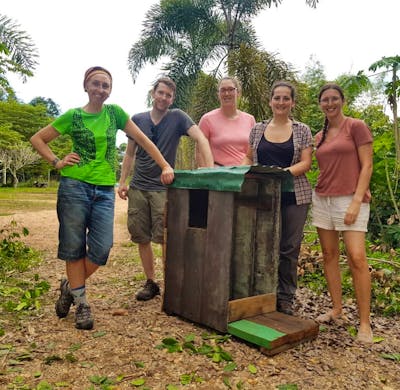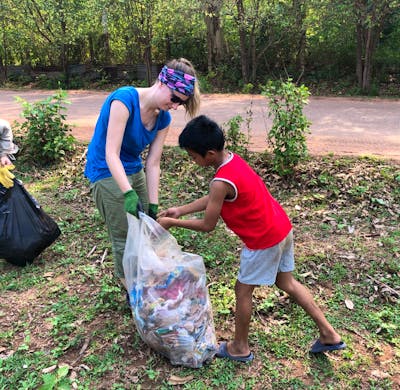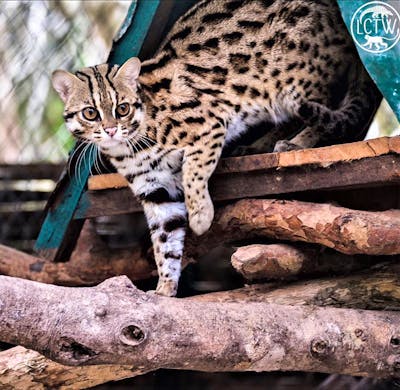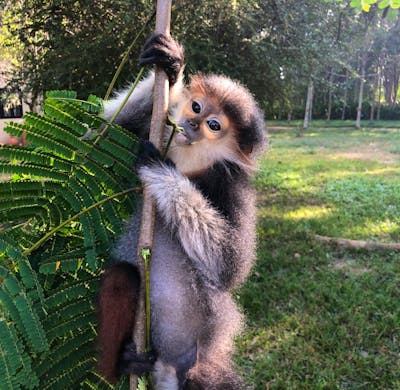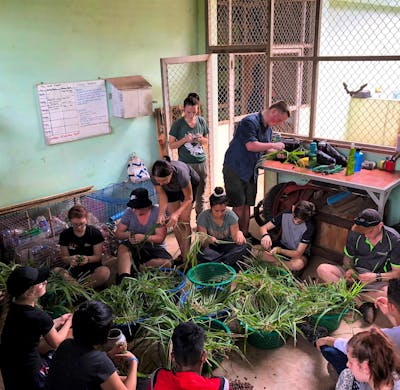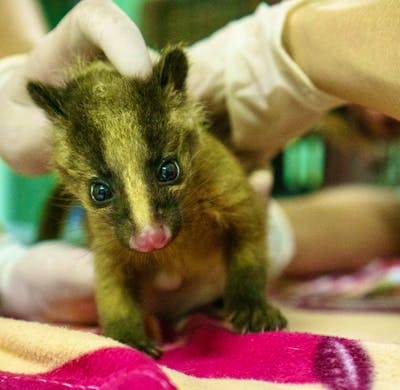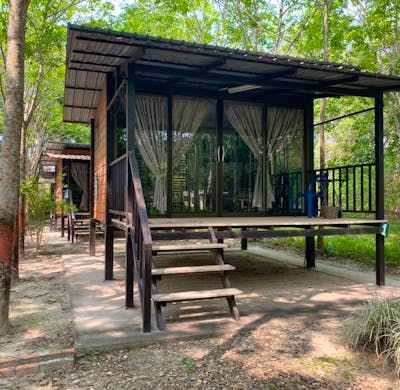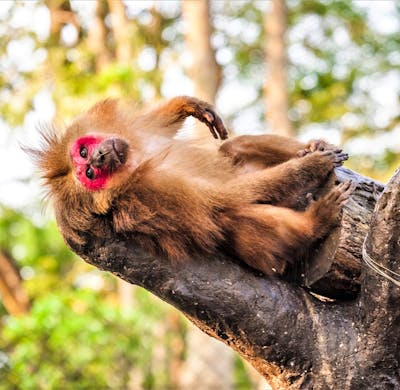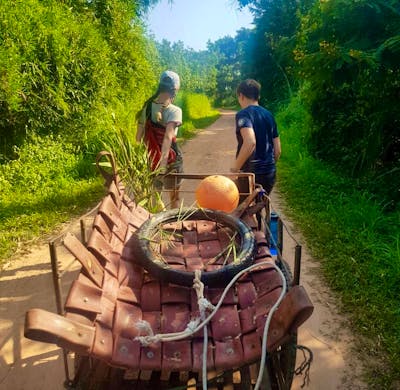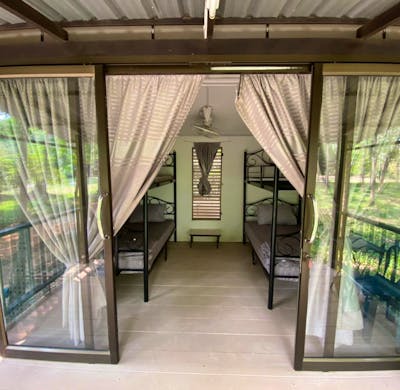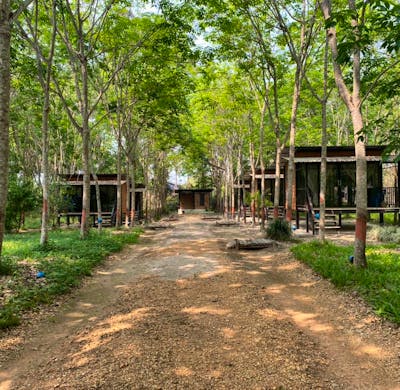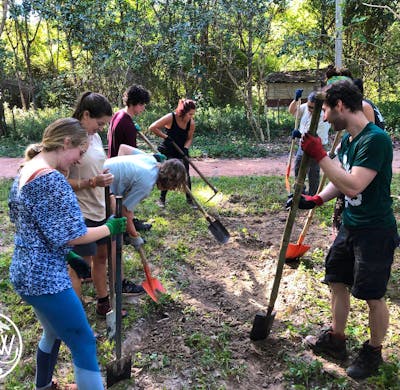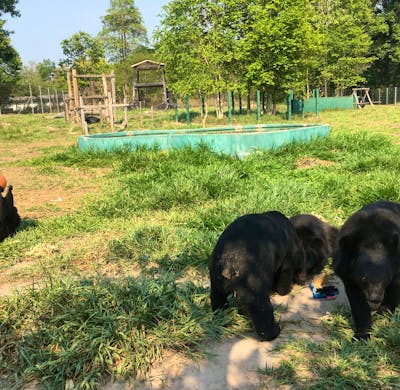Lao Conservation Trust for Wildlife (LCTW) is a non-profit wildlife rescue, conservation and education center. Our mission is to spread awareness of the illegal wildlife trade crisis in Laos and stimulate conservation action within Laos. When possible, our rescues are rehabilitated and released back into the wild where they belong.
Volunteers can expect to work with the different species and teams every day!
Some days we are working with the construction team to build platforms or pools for the animals and other days we could be showing a local school group around the center to tell them about the work we do. Almost everyday we are able to take time to give new enrichment to some of our longer-term residents or work to repair enrichment that may have been broken. Some of the tasks we work on may be urgent and come unexpectedly while others are able to be planned out and implemented over the weeks to come.
In H&E, our job is to ensure that our enclosures are as enriching as possible for the animals. Our aim is to encourage our animals to exhibit natural behaviors through play, foraging, hiding, hunting, interaction and more. We use enrichment to help our animals demonstrate these natural behaviors and keep them content. This, in turn, can reduce the likelihood of stereotypical behaviors such as: pacing, rocking, excessive grooming, etc. We can also reduce stress and increase the occurrence of natural behaviors through enrichment, enclosure design and introduction of the same species (sometimes different species) to their enclosure.
What is enrichment? Enrichment is the process of making life in captivity more exciting and more nurturing for our animals. This leads them to be happier and healthier! Enrichment comes in many forms, sometimes through renovation of their enclosure (pool/shelter/planting trees), different feeding options, toys, novel food items and new smells. We encourage creativity in our enrichment and the use of mostly recycled materials means that we reduce our waste too!
So what will volunteers do? Volunteers will assist their coordinators with cleaning enclosures in the morning and checking on our animals, before feeding them with their morning enrichment. After that, the day will be dedicated to projects and enrichment for different animal groups. Our coordinators work hard to give you a fun and memorable experience here at LCTW. If there is a particular species you would like are interested in learning more about or an idea you have for enrichment please let us know and we will try our best to make it happen!
Working in the tropics with wildlife, gives us plenty of practice in improvisation. Be prepared for plans to change! Tropical thunderstorms are common place in the wet season and this could lead to a day helping teams clear debris from paths or even assisting in enclosure repairs. Like the weather, our animals give us surprises from time-to-time and we appreciate the extra help and understanding when our plans change.
What do volunteers need to bring or be aware of?
Here is a suggested list of items to bring to the LCTW for your volunteer experience. Many of these items are
available in Vientiane however, please make purchases before your pick up time.
We suggest:
- Lightweight work clothes, you do not mind getting dirty or stained
- Long sleeved tops and trousers: to protect you from the sun and insect bites
- Sunhat, cap, or bandanna to protect you against the sun, along with plenty of sun cream
- Torch/flashlight and/or head-torch
- A device with an alarm clock
- Wash towels (they can be bought locally, but options are limited)
- Comfortable shoes or sandals for leisure and closed toe shoes for work
- Lightweight rainproof clothing (e.g. poncho - cheap quality ones can be bought locally)
- Ensure your mobile phone is unlocked if you wish to buy a Lao sim card for data
- Simple first aid kit with bandages, antiseptics, and medications (allergies, headache, stomach bugs, etc.)
- Work gloves
- High-factor sunglasses, a hat and sunscreen are recommended for protection from the sun
- Power adaptor (2 straight pin or 2 round pin)
Optional Season Specific:
These items are not required for you to stay here, though may make your time here more comfortable.
- Rubber boots if coming in rainy season and a good supply of socks (rubber boots can also be bought locally). Good
supply of clothes, especially underwear (getting clean clothes dry is more challenging in wet and humid seasons)
- Warmer clothes for the evenings in the cool season (November-February)
POLICIES AND ETHICS:
Our Animal Policy:
Our animals' welfare, safety and needs, come first at all times. Our center rescues new animals frequently, so some schedules and rules will change to meet the specialized needs of our animals.
Keeping animals happy and busy is a major task at our center. Whenever you have an idea, please discuss this with a member of staff (e.g. enrichment or enclosures, improvements of enclosures and never act alone or without permission.
Please help to observe the animals at the rescue center so we can detect any problems as soon as possible. Always tell someone as soon you notice something to be out of the ordinary. For example, if you notice any wounds or behavior that is unusual for the animal, report this to a member of staff. These situations may involve an animal which is mostly cared for by our volunteer team and we need your help to ensure that all animals are happy and healthy while they are with us. We also ask that you notify staff if you see anything that is broken or needs to be replaced.
LCTW HAS A STRICT HANDS-OFF POLICY. We will ask volunteers to leave immediately if they touch the animals. Unless previously specified by your one of our staff members. LCTW has a strict hands-off policy, this is so we can ease the integration of wildlife with their own species, facilitate future releases back to the wild, as well as ensuring staff, volunteer and animal safety.
Unfortunately, most of our animals have already had too much contact with humans as most are victims of the illegal wildlife trade. Due to this some may look like they want attention and we ask volunteers not to touch them. Animals appearing to give social interaction are most likely NOT trying to be friendly. In the majority of cases, this behavior is a sign of significant stress and submission. Do not be drawn in by it.
For example, a Gibbon showing you his/her back is not a gesture of wanting a back scratch, it is a sign that the animal is submitting due to your presence.
Though it may be a nice experience for you to touch an animal, there is a very real risk of disease transmission, some with obvious symptoms (if you have a cold or cough) and some without. If you see something you are unsure about or do not agree with please talk directly to the Coordinators or Director. They can answer any questions you may have regarding the animals here at LCTW. We are open to new ideas and we are transforming this site into a world class rescue center. We would encourage you to share your creativity, ideas and opinions with your coordinators or the LCTW Director.
Cultural sensitivity and dress code:
LAO CULTURE
Laos is such a friendly place that there are generally no major cultural issues, though to really settle in, here are a few pointers:
- When Lao people meet, they do not shake hands, they 'wai’. When meeting someone, put your hands into prayer formation thumbs pointing towards your nose and bow your head slightly. If they 'wai’ you first, you should 'wai’ back.
- Do not point the soles of your feet at anyone, or any images depicting Buddha. As feet are considered impure, make sure you are not putting your feet on tables, chairs or anywhere close to someone’s head or in line of their eyesight.
- Touching heads of Lao people or Buddhist statues is also an insult.
- Remove shoes when entering a temple, shops, houses, as well as your rooms. It’s a sign of respect (it also keeps your
room clean).
- Physical expressions of love (eg. hugging, kissing) is not very common and you are advised to avoid such actions in public.
- Smile and speak a little Lao and you will be loved by the locals. 'Sabaidee', pronounced 'Sab-ai-dee' is the standard Lao greeting, which you can use for all people. Do not take offence if they call you 'farang’, pronounced 'fa-lang' - this translates as foreigner and is often used to describe westerners.
- Lao people are very proud of their country, if you make a real effort to understand and respect the Lao culture, you will find this really enhances your experience of Laos.
Remember that cultural expectations may be different here than in your country. In order to be respectful of the culture here in Laos we do require the following dress codes:
• Volunteers should not display any midriff, cleavage, or large amounts of back.
• Tank tops/singlets with thick shoulder straps are preferable over 'spaghetti' straps. Though tops that cover your shoulders or even long sleeve are recommended as this will give you extra sun protection, protection against mosquitoes along with being culturally appropriate.
• Shorts should not be shorter than mid-thigh range.
• Must not walk around on-site in swim wear at any time
Sexual interactions or sexual relationships with the local or expat staff are prohibited.
Sexual relations with Lao people is illegal and carries heavy punishment in Laos. DO NOT engage in any sexually intimate behavior with a local person while you are volunteering with us. You will be asked to leave if this conduct takes place.
On site dress code:
Please do not wear any jewelry whilst working in the center. Many animals (especially primates) are very attracted to shiny objects and they can grab and pull, which could harm both you and the animal if they ingest it. This is most prudent with facial piercings such as nose rings and large ear rings. It is also possible to get jewelry stuck in cages or on tools when working.
Headphones are not be worn whilst working around the rescue center. Apart from the risk of being distracted if something is happening around you, it is also dangerous if you cannot hear any warnings being shouted out.
Ground based infections such as tetanus and a variety of parasites are not uncommon and can contaminate your feet if left unprotected. Toe, foot, and ankle injuries are common injuries when conducting physical work, which if you are in our husbandry and enrichment program this will make up much of the work you do. Therefore, footwear with good ankle support are recommended.
Take extra care after a rain or hosing cement the ground becomes very slippery.
LCTW has a ZERO TOLERANCE for drugs. If volunteers are found with illegal substances they will immediately be escorted off the premises and reported to the police. If the police find you on-site with drugs this will have serious consequences for our center. After 5:00pm on your working days (and days off) you can socialize with everyone in the living area and this includes the consumption of alcohol if you are of legal age. However, after 10:00pm please keep noise down and return to your accommodation. Remember other volunteers and staff who live in the house may not want to socialize and it is their house as they are here year round. Heavy drinking and drunken disruptive behavior will not be tolerated and could lead to you being asked to leave the center.
Working with wild animals early in the morning when you are hungover is dangerous for yourself, other volunteers, staff and the animals. If we think you are hungover we have the right to ask you not to work. If you turn up to work drunk you will be asked to leave the center.
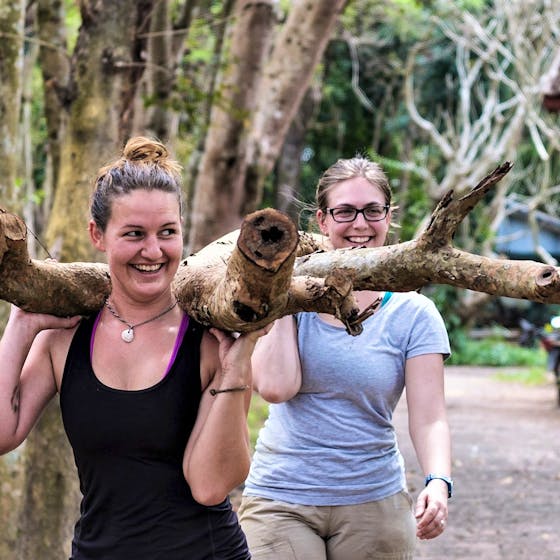
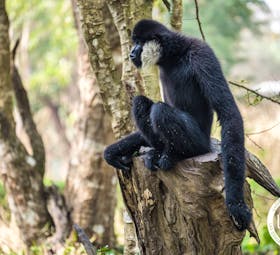
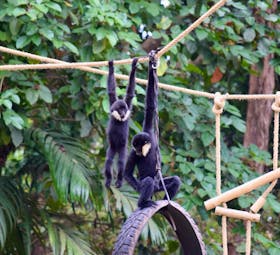
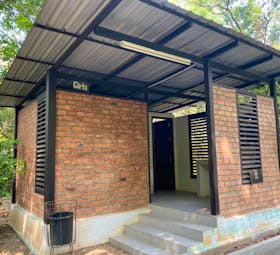
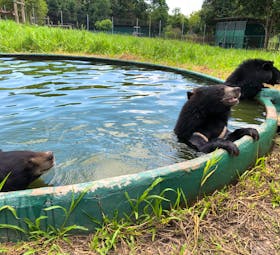
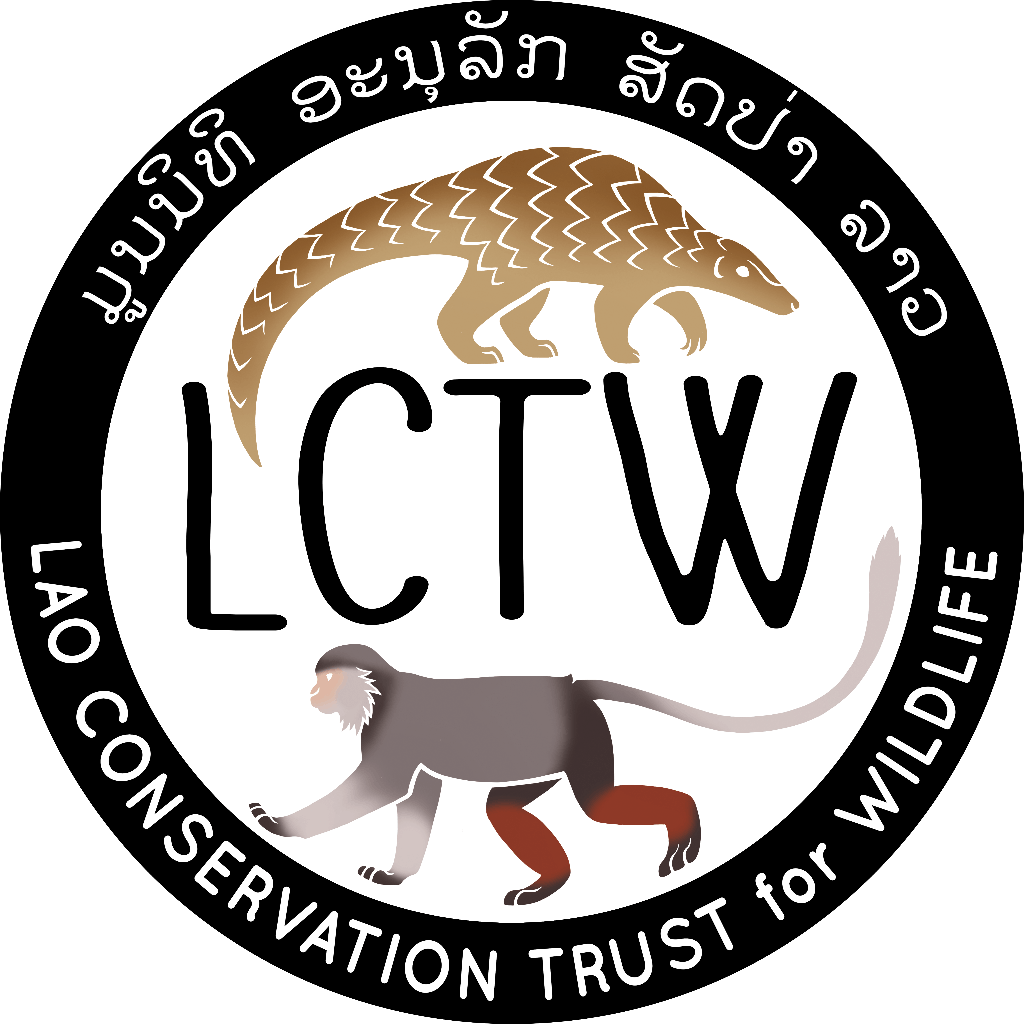
 4.8
4.8

